Dads Playing With My Nipple Again Facebook
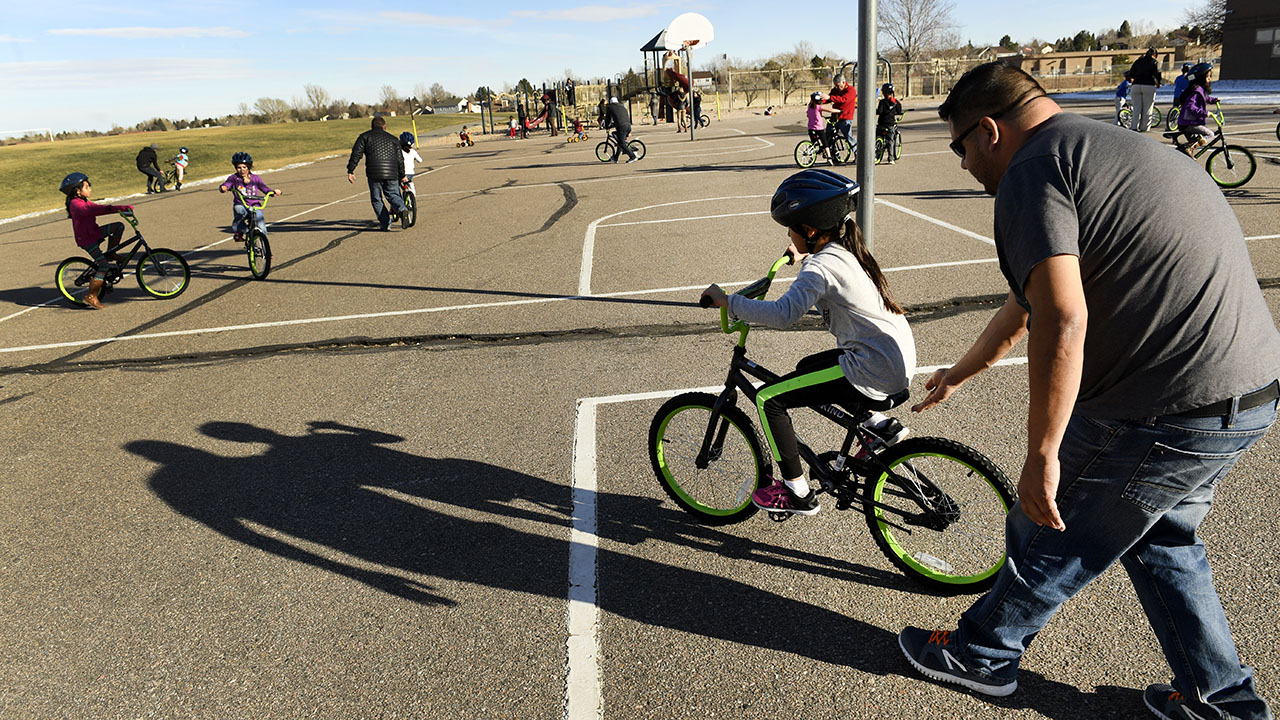
Fatherhood in America is changing. Today, fathers who live with their children are taking a more than active function in caring for them and helping out around the business firm, and the ranks of unmarried fathers have grown significantly in recent decades. At the same time, more and more children are growing up without a father in the home.
The irresolute office of fathers has introduced new challenges as dads juggle the competing demands of family and work. Hither are some key findings about fathers from Pew Research Heart.
ane 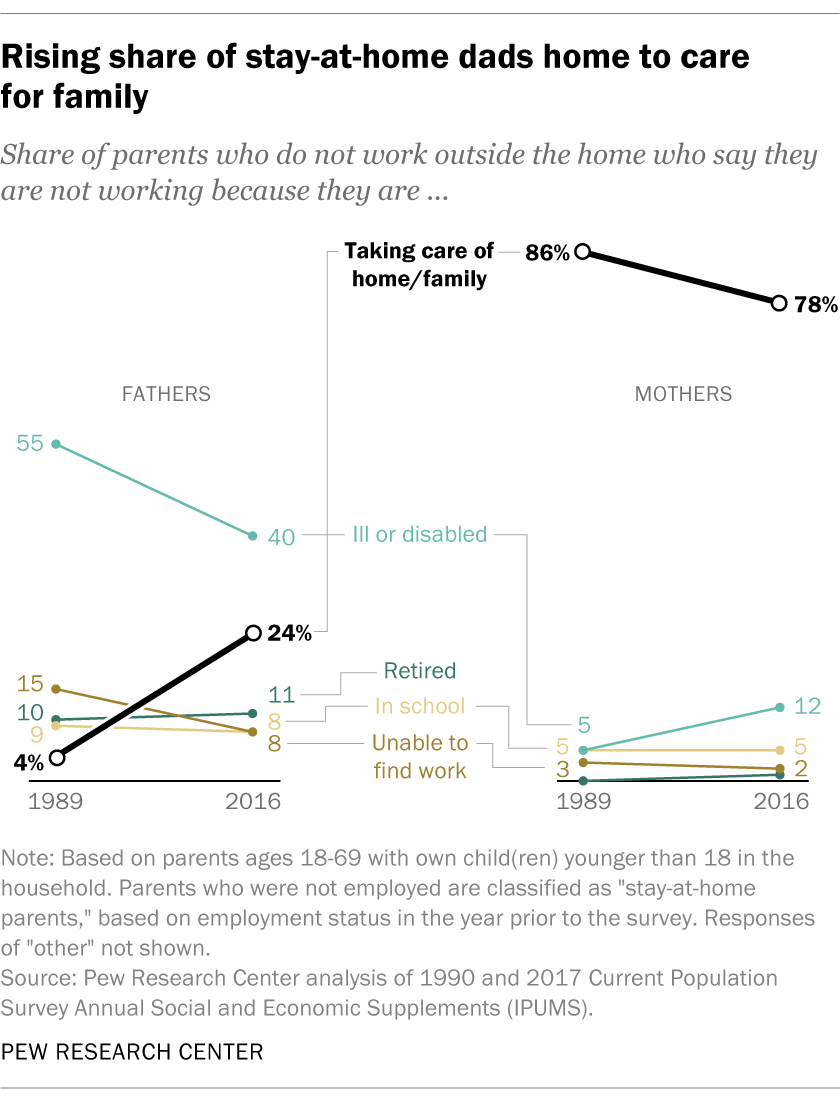 More dads are staying domicile to care for their kids. The share of fathers who are stay-calm dads ticked upward from 4% in 1989 to seven% in 2016. As a outcome, dads fabricated up 17% of all stay-at-abode parents in 2016, up from 10% in 1989. Among Millennials (those ages twenty to 35 in 2016), 6% of dads were at habitation with their kids. Past comparison, 3% of Gen Ten dads were at home with their kids when they were the same age.
More dads are staying domicile to care for their kids. The share of fathers who are stay-calm dads ticked upward from 4% in 1989 to seven% in 2016. As a outcome, dads fabricated up 17% of all stay-at-abode parents in 2016, up from 10% in 1989. Among Millennials (those ages twenty to 35 in 2016), 6% of dads were at habitation with their kids. Past comparison, 3% of Gen Ten dads were at home with their kids when they were the same age.
Among stay-at-abode dads, information technology's condign much more mutual to be domicile specifically to care for family unit. In 2016, 24% of stay-at-home dads reported that this was the main reason they were at home, upwards from simply four% in 1989. In comparison, 78% of stay-calm moms reported this was the principal reason they were home, down from 86% in 1989.
2 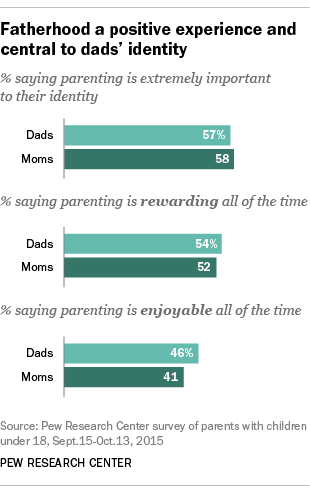 Dads see parenting as central to their identity. Dads are just as probable as moms to say that parenting is extremely important to their identity. Some 57% of fathers said this in a 2015 survey past the Middle, compared with 58% of mothers. Similar moms, many dads also seem to appreciate the benefits of parenthood: 54% reported that parenting is rewarding all of the time, as did 52% of moms. Meanwhile, 46% of fathers and 41% of mothers said they detect parenting enjoyable all of the fourth dimension.
Dads see parenting as central to their identity. Dads are just as probable as moms to say that parenting is extremely important to their identity. Some 57% of fathers said this in a 2015 survey past the Middle, compared with 58% of mothers. Similar moms, many dads also seem to appreciate the benefits of parenthood: 54% reported that parenting is rewarding all of the time, as did 52% of moms. Meanwhile, 46% of fathers and 41% of mothers said they detect parenting enjoyable all of the fourth dimension.
A sizable minority of childless men (44% of those eighteen to 49) promise to go fathers at some point, and another 35% are unsure if they want to become parents, co-ordinate to a 2017 Pew Research Centre survey. Among childless women in the same historic period group, fifty% want to get mothers, while 22% are unsure if they desire to.
iii 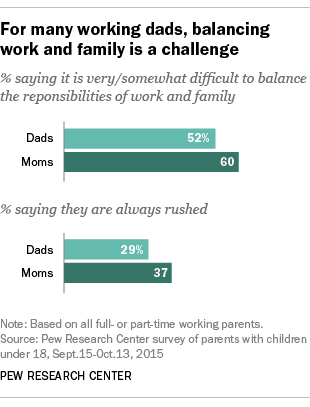 Work-family unit balance is a challenge for many working fathers. Just like mothers, many of today's fathers notice it challenging to balance work and family life. About half of working dads (52%) said in 2015 that it is very or somewhat hard to do and so, a slightly smaller share than the 60% of working mothers who said the same. And about three-in-x working dads (29%) said they "always feel rushed," as did 37% of working mothers.
Work-family unit balance is a challenge for many working fathers. Just like mothers, many of today's fathers notice it challenging to balance work and family life. About half of working dads (52%) said in 2015 that it is very or somewhat hard to do and so, a slightly smaller share than the 60% of working mothers who said the same. And about three-in-x working dads (29%) said they "always feel rushed," as did 37% of working mothers.
4 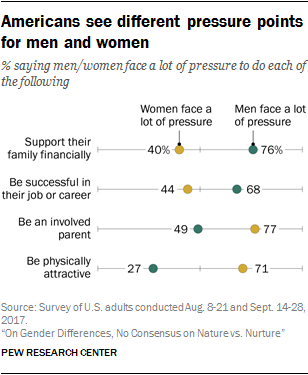 Most Americans think men face a lot of pressure to provide financially for their family. Nigh 3-fourths of adults (76%) said in a 2017 survey that men face a lot of pressure level to support their family financially, while 49% said men face up a lot of pressure to be an involved parent. In contrast, 77% said women face a lot of force per unit area to be an involved parent, and 40% said women face up a lot of pressure to support their family financially.
Most Americans think men face a lot of pressure to provide financially for their family. Nigh 3-fourths of adults (76%) said in a 2017 survey that men face a lot of pressure level to support their family financially, while 49% said men face up a lot of pressure to be an involved parent. In contrast, 77% said women face a lot of force per unit area to be an involved parent, and 40% said women face up a lot of pressure to support their family financially.
In addition, the public thinks working fathers are under more force per unit area than working moms to return to their task after the nascence or adoption of a kid. A 2016 survey found that virtually one-half of adults (49%) said employers put more than pressure on fathers to return to work quickly after the birth or adoption of a new child, while eighteen% said employers put more pressure on mothers. A third said employers pressure level mothers and fathers about equally.
5 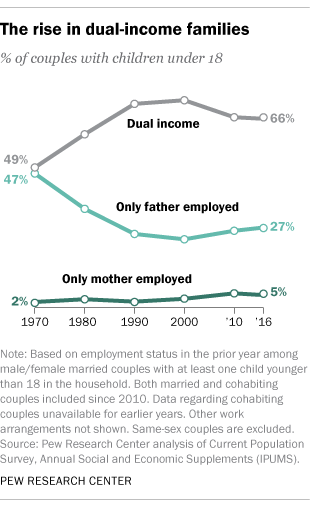 It's become less common for dads to be their family's sole breadwinner. Every bit of 2016, about a quarter of couples (27%) who live with children younger than 18 were in families where merely the father works. This marked a dramatic change from 1970, when well-nigh half of these couples (47%) were in families where only the dad worked. The share of couples living in dual-earner families has risen significantly and now comprises the bulk of two-parent families with children.
It's become less common for dads to be their family's sole breadwinner. Every bit of 2016, about a quarter of couples (27%) who live with children younger than 18 were in families where merely the father works. This marked a dramatic change from 1970, when well-nigh half of these couples (47%) were in families where only the dad worked. The share of couples living in dual-earner families has risen significantly and now comprises the bulk of two-parent families with children.
6 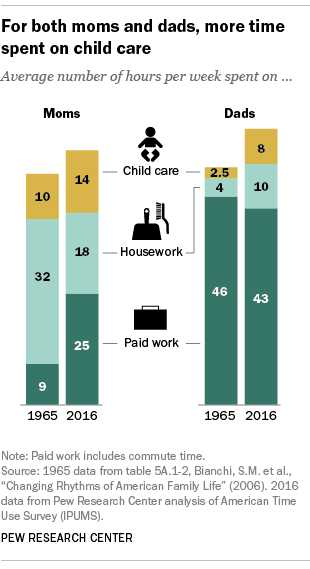 Dads are much more involved in child care than they were fifty years ago. In 2016, fathers reported spending an average of eight hours a week on child intendance – about triple the fourth dimension they provided in 1965. And fathers put in most 10 hours a week on household chores in 2016, up from four hours in 1965. By comparison, mothers spent an boilerplate of most fourteen hours a week on kid care and 18 hours a calendar week on housework in 2016.
Dads are much more involved in child care than they were fifty years ago. In 2016, fathers reported spending an average of eight hours a week on child intendance – about triple the fourth dimension they provided in 1965. And fathers put in most 10 hours a week on household chores in 2016, up from four hours in 1965. By comparison, mothers spent an boilerplate of most fourteen hours a week on kid care and 18 hours a calendar week on housework in 2016.
7When it comes to caregiving, moms and dads are notwithstanding viewed differently. About half of Americans (53%) in 2016 said that, breast-feeding aside, mothers do a better job than fathers caring for a new babe. A somewhat smaller share (45%) said mothers and fathers practice nigh every bit well, and ane% of Americans said fathers do a better chore than mothers.
While most (71%) said it'south equally important for new babies to bond with their mother and their male parent, about a quarter (27%) said it'due south more important for new babies to bail with their moms, and 2% said it's more than important for new babies to bond with their fathers.
Some likewise see an advantage to moms – more than dads – caring for young children. Among the plurality of adults (44%) who said the ideal situation for a immature kid with two parents is for i parent to stay home, 39% said it's better if that parent is the mother, while just v% said a child is better off if the father stays habitation. More than half (56%) said information technology doesn't affair which parent stays dwelling.
8 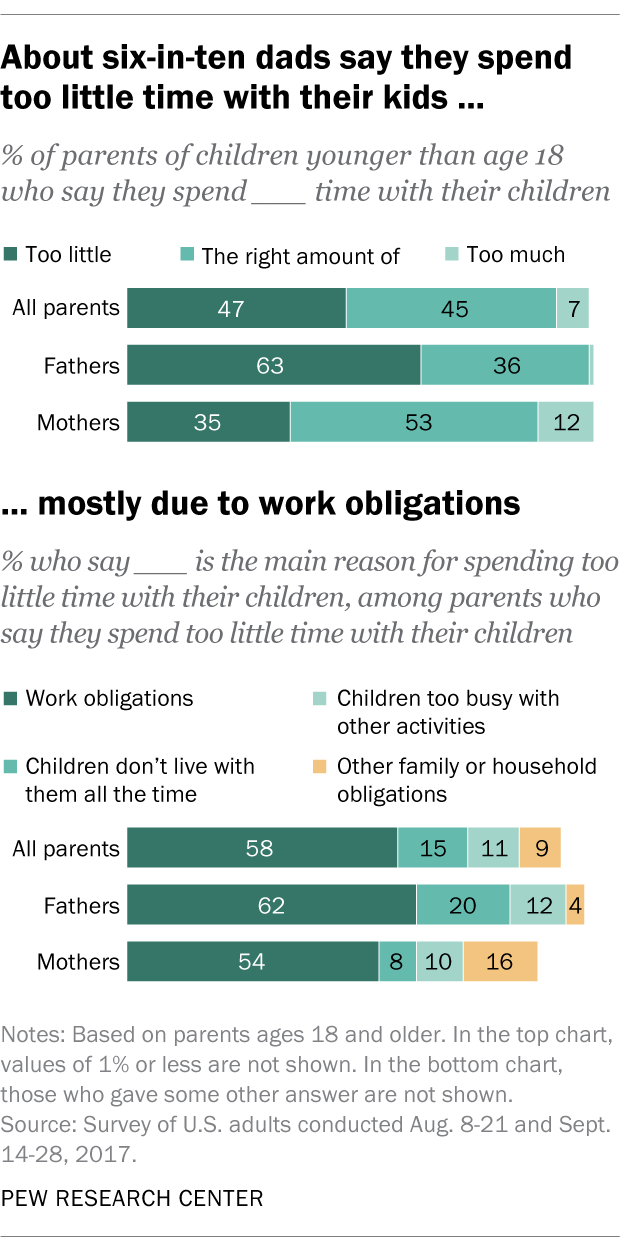 While they're spending more time with their children, many dads feel they're not doing plenty. Most dads (63%) said in a 2017 survey that they spend too little fourth dimension with their kids, compared with 35% of mothers who said the aforementioned. Amongst both dads and moms who said they spend too little time with their kids, work obligations were cited well-nigh often as the main reason.
While they're spending more time with their children, many dads feel they're not doing plenty. Most dads (63%) said in a 2017 survey that they spend too little fourth dimension with their kids, compared with 35% of mothers who said the aforementioned. Amongst both dads and moms who said they spend too little time with their kids, work obligations were cited well-nigh often as the main reason.
Dads are also less positive near their ain parenting abilities than are moms. Simply 39% of fathers said in 2015 that they were doing a "very good chore" raising their children, compared with 51% of mothers.
Annotation: This is an update of a post originally published on June 12, 2014.

Gretchen Livingston is a sometime senior researcher focusing on fertility and family unit demographics at Pew Research Center.

Kim Parker is director of social trends research at Pew Research Center.
Source: https://www.pewresearch.org/fact-tank/2019/06/12/fathers-day-facts/
0 Response to "Dads Playing With My Nipple Again Facebook"
Post a Comment